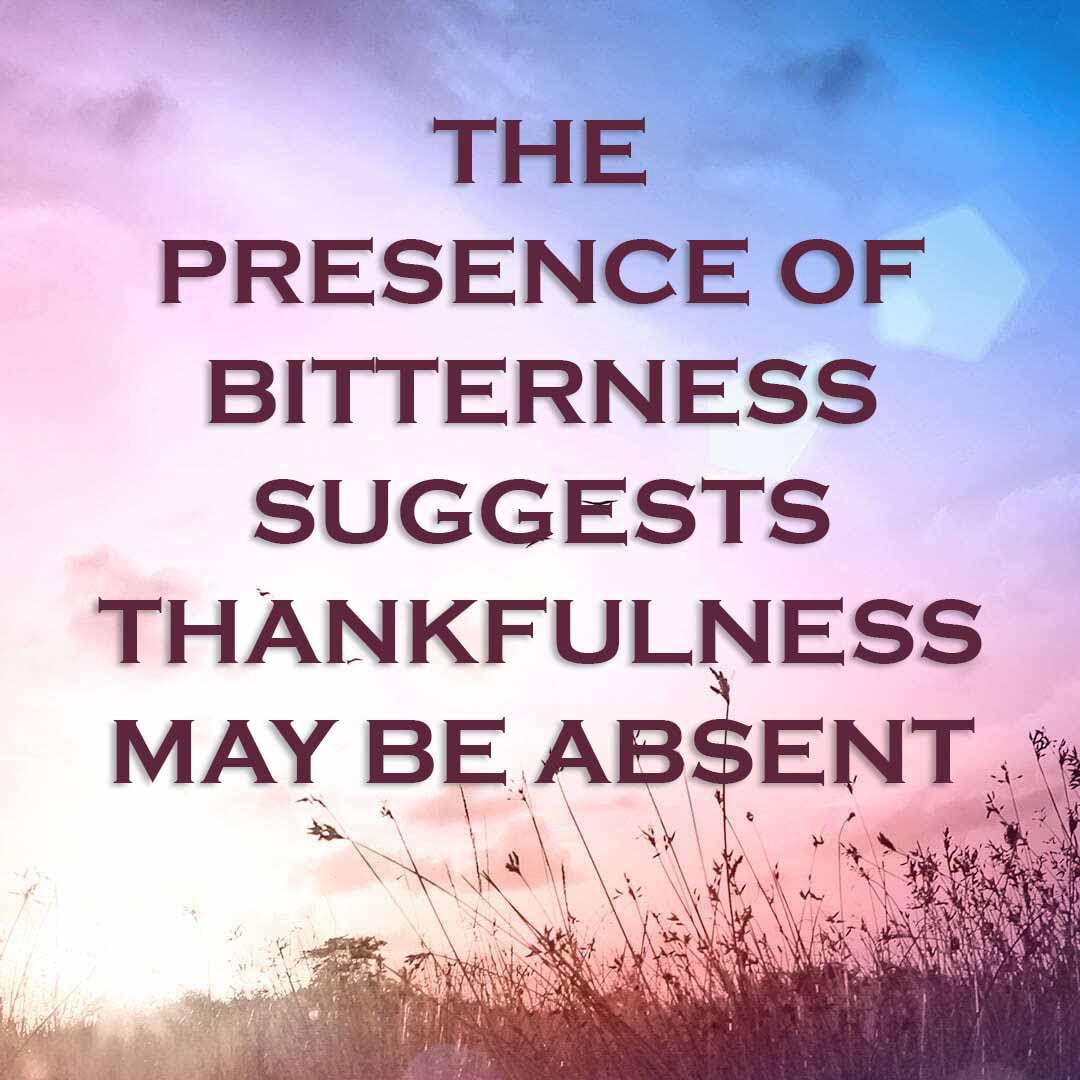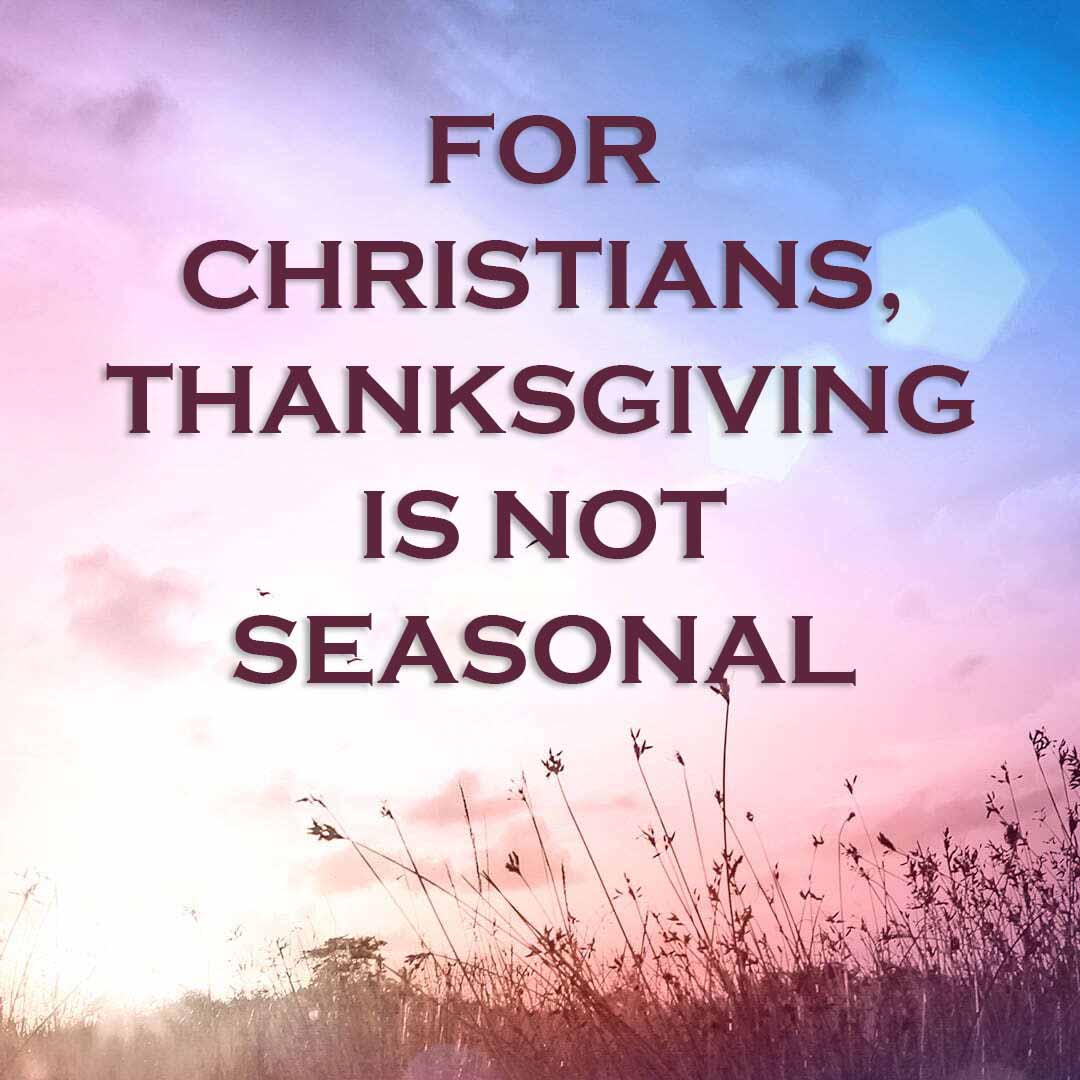If you enjoy seeing science validate the teachings of Scripture, search for “health benefits of gratitude” on the Internet. Links to study after study will appear, describing the health benefits—physical and emotional—of living with an “attitude of gratitude.” What is the biblical teaching on thanksgiving? The apostle Paul says it succinctly: “Rejoice always, pray without ceasing, in everything give thanks; for this is the will of God in Christ Jesus for you” (1 Thessalonians 5:16-18). But what does it look like to give thanks in everything?
Giving Thanks in Everything
Giving Thanks, Even in Hard Times
Giving Thanks in Everything at All Times
In Everything, I Will Give Thanks
Giving Thanks in Everything
The most important thing to notice about 1 Thessalonians 5:18 is that it doesn’t tell us to give thanks “for everything” but “in everything.” The Bible wouldn’t expect us to thank God for evil, hurtful, harmful, or tragic situations. Instead, we can be thankful for God’s sovereignty because He causes all things to work together for our good when we belong to Him. We can be grateful knowing God uses trials to conform us to the image of Christ (Romans 8:28-29).
Nancy Leigh DeMoss carefully studied all the biblical references to thankfulness. She spent months looking at what the Bible says about the grace of gratitude and meditating on the implications of those verses. After her systematic journey through the Word of God, she concluded: “I’ve seen that if I am not ceaselessly vigilant about rejecting ingratitude and choosing gratitude, I all-too-easily get sucked into the undertow of life in a fallen world. I start focusing on what I don’t have that I want, or what I want that I don’t have. My life starts to feel hard, wearisome, and overwhelming.”

“A lack of gratitude,” Nancy continued, “manifests itself in fretting, complaining, and resenting…. Even in the most turbulent waters, choosing gratitude rescues me from myself and my runaway emotions. It buoys me on the grace of God.”1 I wonder how our attitudes would change if we looked up every biblical reference to thanksgiving and gratitude and took them seriously. If bitterness is present in our life, it’s a strong indication that thankfulness is absent.
In Paul’s letter to the Philippians, he wrote, “Be anxious for nothing, but in everything by prayer and supplication, with thanksgiving, let your requests be made known to God; and the peace of God, which surpasses all understanding, will guard your hearts and minds through Christ Jesus” (Philippians 4:6-7). The Greek word for anxious means to have “a mind divided” between legitimate thoughts and destructive thoughts. Destructive thoughts will choke out the Word of God and cause Christians to abandon trust. But by entrusting our needs to God and filling our minds with gratitude, we can experience peace. Right thinking wins the battle against worry.

Recommended Reading: “God Has Not Forgotten You”
Giving Thanks, Even in Hard Times
On Thanksgiving Day 2001, Carole Lewis suffered the tragic loss of her daughter in a traffic accident. As she shared details of the ordeal in her book, A Thankful Heart, Carole claimed 1 Thessalonians 5:18 as the spiritual secret that sustained her during that time. “Developing a thankful heart for all the moments of our lives, both good and bad, mean that instead of ranting against the things we can’t change, we choose to thank God. I believe that being thankful to God has the potential not only to alter our perceptions of our circumstances but also to heal our hearts during the most painful circumstances of life.”2
Looking at hardship through the lens of thanksgiving allows us to see everything more clearly. Ann Voskamp puts it this way: “To give thanks is an action and rejoice is a verb and these things are not mere pulsing emotions. While I may not always feel joy, God asks me to give thanks in all things, because He knows that the feeling of joy begins in the action of thanksgiving.”3
When we’re sick, we can thank God for the parts of our body that still work and for the diseases we do not have. When we face a setback, we can thank the Lord for all the areas of life that are in good shape. When there are dark clouds, we can thank God for silver linings. To paraphrase G. K. Chesterton, instead of taking things for granted, we do well to take them with gratitude.
We live in a world of uncertainty, but the Lord promises, “I will certainly be with you” (Exodus 3:12). With God’s presence to accompany us, His Word to instruct us, His providence to work all things for our good, and His future prepared for us, we have every reason to face the future with confidence.
Recommended Reading: “Why Does God Let Bad Things Happen?”

Give Thanks in Everything at All Times
Americans set aside one day in November to give thanks. However, the apostle Paul encouraged us to be “giving thanks always for all things to God the Father in the name of our Lord Jesus Christ” (Ephesians 5:20). For Christians, thanksgiving is not seasonal. The Word of God is filled with counsel to give thanks to God all the time. Here are just a few examples:
Give thanks all day.
“It is good to give thanks to the Lord, and to sing praises to Your name, O Most High; to declare Your lovingkindness in the morning, and Your faithfulness every night”(Psalm 92:1-2).
Give thanks at nighttime.
“At midnight I will rise to give thanks to You, because of Your righteous judgments” (Psalm 119:62).
Give thanks whether eating or abstaining.
“The one who eats, eats in honor of the Lord, since he gives thanks to God, while the one who abstains, abstains in honor of the Lord and gives thanks to God” (Romans 14:6, ESV).
Give thanks for what God provides.
“Since everything God created is good, we should not reject any of it but receive it with thanks” (1 Timothy 4:4, NLT).
Give thanks in God’s presence.
“Make a joyful shout to the Lord, all you lands! Serve the Lord with gladness; come before His presence with singing. Know that the Lord, He is God; it is He who has made us, and not we ourselves; we are His people and the sheep of His pasture. Enter into His gates with thanksgiving, and into His courts with praise. Be thankful to Him, and bless His name. For the Lord is good; His mercy is everlasting, and His truth endures to all generations” (Psalm 100).
Give thanks to God in prayer.
“Continue earnestly in prayer, being vigilant in it with thanksgiving” (Colossians 4:2).
Give thanks in everything you do.
“And whatever you do in word or deed, do all in the name of the Lord Jesus, giving thanks to God the Father through Him” (Colossians 3:17).
Recommended Reading: “7 Steps to a Closer Walk With God”
In Everything, I Will Give Thanks
In 1 Kings 8, King Solomon prayed one of the Bible’s longest prayers when he dedicated the temple in Jerusalem. The occasion commemorated a high-water mark in Jewish history. God’s glory descended, and a cloud filled the temple. Overwhelmed, Solomon knelt before the Lord, raised his hands toward heaven, and led God’s people in a moving prayer of dedication. Then, lifting himself to his feet, he addressed the people and praised God with thanksgiving, saying, “There has not failed one word of all His good promise” (1 Kings 8:56).

There were times when Solomon failed—and times when the Jewish people failed. The priests and prophets were subject to failure, and sometimes the entire nation failed. But God cannot fail, will not fail, and His promises never falter. His faithfulness doesn’t depend on our perfection; it’s rooted in His perfection, for there is no shadow of turning with Him.
The concept of giving thanks expanded from the Old Testament to the New. In the Old Testament, God’s people typically thanked Him “for” things—His works, attributes, and blessings (Psalm 107:8-9). While that practice continued in the New Testament, it expanded to giving thanks “in” all circumstances. Why not do both today? Give thanks to God for His blessings, and give thanks to Him in whatever conditions you are experiencing. Fill this day with gratitude to God.
Sources:
1Nancy Leigh DeMoss, Choosing Gratitude (Chicago: Moody, 2009), 16-17.
2Carole Lewis, A Thankful Heart (Ventura, CA: Regal), passim.
3Ann Voskamp, One Thousand Gifts: A Dare to Live Fully Right Where You Are (Grand Rapids: Zondervan, 2010, 176)
